+ Open data
Open data
- Basic information
Basic information
| Entry | Database: PDB / ID: 8vbl | ||||||
|---|---|---|---|---|---|---|---|
| Title | Structure of bovine anti-HIV Fab ElsE6 | ||||||
 Components Components |
| ||||||
 Keywords Keywords | IMMUNE SYSTEM / antibody / Fab fragment / bovine | ||||||
| Biological species |  | ||||||
| Method |  X-RAY DIFFRACTION / X-RAY DIFFRACTION /  SYNCHROTRON / SYNCHROTRON /  MOLECULAR REPLACEMENT / Resolution: 2.35 Å MOLECULAR REPLACEMENT / Resolution: 2.35 Å | ||||||
 Authors Authors | Stanfield, R.L. / Wilson, I.A. | ||||||
| Funding support |  United States, 1items United States, 1items
| ||||||
 Citation Citation |  Journal: PLoS Pathog / Year: 2024 Journal: PLoS Pathog / Year: 2024Title: Immunization of cows with HIV envelope trimers generates broadly neutralizing antibodies to the V2-apex from the ultralong CDRH3 repertoire. Authors: Pilar X Altman / Gabriel Ozorowski / Robyn L Stanfield / Jeremy Haakenson / Michael Appel / Mara Parren / Wen-Hsin Lee / Huldah Sang / Jordan Woehl / Karen Saye-Francisco / Leigh M Sewall / ...Authors: Pilar X Altman / Gabriel Ozorowski / Robyn L Stanfield / Jeremy Haakenson / Michael Appel / Mara Parren / Wen-Hsin Lee / Huldah Sang / Jordan Woehl / Karen Saye-Francisco / Leigh M Sewall / Collin Joyce / Ge Song / Katelyn Porter / Elise Landais / Raiees Andrabi / Ian A Wilson / Andrew B Ward / Waithaka Mwangi / Vaughn V Smider / Dennis R Burton / Devin Sok /  Abstract: The generation of broadly neutralizing antibodies (bnAbs) to conserved epitopes on HIV Envelope (Env) is one of the cornerstones of HIV vaccine research. The animal models commonly used for HIV do ...The generation of broadly neutralizing antibodies (bnAbs) to conserved epitopes on HIV Envelope (Env) is one of the cornerstones of HIV vaccine research. The animal models commonly used for HIV do not reliably produce a potent broadly neutralizing serum antibody response, with the exception of cows. Cows have previously produced a CD4 binding site response by homologous prime and boosting with a native-like Env trimer. In small animal models, other engineered immunogens were shown to focus antibody responses to the bnAb V2-apex region of Env. Here, we immunized two groups of cows (n = 4) with two regimens of V2-apex focusing Env immunogens to investigate whether antibody responses could be generated to the V2-apex on Env. Group 1 was immunized with chimpanzee simian immunodeficiency virus (SIV)-Env trimer that shares its V2-apex with HIV, followed by immunization with C108, a V2-apex focusing immunogen, and finally boosted with a cross-clade native-like trimer cocktail. Group 2 was immunized with HIV C108 Env trimer followed by the same HIV trimer cocktail as Group 1. Longitudinal serum analysis showed that one cow in each group developed serum neutralizing antibody responses to the V2-apex. Eight and 11 bnAbs were isolated from Group 1 and Group 2 cows, respectively, and showed moderate breadth and potency. Potent and broad responses in this study developed much later than previous cow immunizations that elicited CD4bs bnAbs responses and required several different immunogens. All isolated bnAbs were derived from the ultralong CDRH3 repertoire. The finding that cow antibodies can target more than one broadly neutralizing epitope on the HIV surface reveals the generality of elongated structures for the recognition of highly glycosylated proteins. The exclusive isolation of ultralong CDRH3 bnAbs, despite only comprising a small percent of the cow repertoire, suggests these antibodies outcompete the long and short CDRH3 antibodies during the bnAb response. | ||||||
| History |
|
- Structure visualization
Structure visualization
| Structure viewer | Molecule:  Molmil Molmil Jmol/JSmol Jmol/JSmol |
|---|
- Downloads & links
Downloads & links
- Download
Download
| PDBx/mmCIF format |  8vbl.cif.gz 8vbl.cif.gz | 125.8 KB | Display |  PDBx/mmCIF format PDBx/mmCIF format |
|---|---|---|---|---|
| PDB format |  pdb8vbl.ent.gz pdb8vbl.ent.gz | 77.5 KB | Display |  PDB format PDB format |
| PDBx/mmJSON format |  8vbl.json.gz 8vbl.json.gz | Tree view |  PDBx/mmJSON format PDBx/mmJSON format | |
| Others |  Other downloads Other downloads |
-Validation report
| Summary document |  8vbl_validation.pdf.gz 8vbl_validation.pdf.gz | 435.3 KB | Display |  wwPDB validaton report wwPDB validaton report |
|---|---|---|---|---|
| Full document |  8vbl_full_validation.pdf.gz 8vbl_full_validation.pdf.gz | 439.9 KB | Display | |
| Data in XML |  8vbl_validation.xml.gz 8vbl_validation.xml.gz | 21.4 KB | Display | |
| Data in CIF |  8vbl_validation.cif.gz 8vbl_validation.cif.gz | 28.2 KB | Display | |
| Arichive directory |  https://data.pdbj.org/pub/pdb/validation_reports/vb/8vbl https://data.pdbj.org/pub/pdb/validation_reports/vb/8vbl ftp://data.pdbj.org/pub/pdb/validation_reports/vb/8vbl ftp://data.pdbj.org/pub/pdb/validation_reports/vb/8vbl | HTTPS FTP |
-Related structure data
| Related structure data | 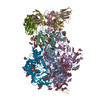 8tq1C  8v4iC 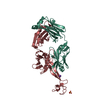 8vbjC 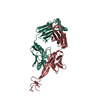 8vbkC 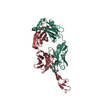 8vbmC 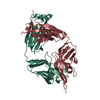 8vbnC 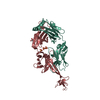 8vboC 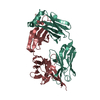 8vbpC 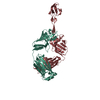 8vbqC  8vbrC C: citing same article ( |
|---|
- Links
Links
- Assembly
Assembly
| Deposited unit | 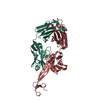
| ||||||||||||
|---|---|---|---|---|---|---|---|---|---|---|---|---|---|
| 1 |
| ||||||||||||
| Unit cell |
| ||||||||||||
| Components on special symmetry positions |
|
- Components
Components
| #1: Antibody | Mass: 22527.611 Da / Num. of mol.: 1 Source method: isolated from a genetically manipulated source Source: (gene. exp.)   Homo sapiens (human) Homo sapiens (human) |
|---|---|
| #2: Antibody | Mass: 27735.822 Da / Num. of mol.: 1 Source method: isolated from a genetically manipulated source Source: (gene. exp.)   Homo sapiens (human) Homo sapiens (human) |
| #3: Water | ChemComp-HOH / |
| Has protein modification | Y |
-Experimental details
-Experiment
| Experiment | Method:  X-RAY DIFFRACTION / Number of used crystals: 1 X-RAY DIFFRACTION / Number of used crystals: 1 |
|---|
- Sample preparation
Sample preparation
| Crystal | Density Matthews: 3.16 Å3/Da / Density % sol: 61.13 % |
|---|---|
| Crystal grow | Temperature: 293 K / Method: vapor diffusion, sitting drop / pH: 9.5 / Details: 0.1M CHES, pH 9.5, 50% Peg200 |
-Data collection
| Diffraction | Mean temperature: 100 K / Serial crystal experiment: N |
|---|---|
| Diffraction source | Source:  SYNCHROTRON / Site: SYNCHROTRON / Site:  SSRL SSRL  / Beamline: BL12-2 / Wavelength: 0.97946 Å / Beamline: BL12-2 / Wavelength: 0.97946 Å |
| Detector | Type: DECTRIS PILATUS 6M / Detector: PIXEL / Date: Nov 6, 2021 |
| Radiation | Protocol: SINGLE WAVELENGTH / Monochromatic (M) / Laue (L): M / Scattering type: x-ray |
| Radiation wavelength | Wavelength: 0.97946 Å / Relative weight: 1 |
| Reflection | Resolution: 2.35→46.8 Å / Num. obs: 27206 / % possible obs: 99.7 % / Observed criterion σ(F): 0 / Observed criterion σ(I): -3 / Redundancy: 6.2 % / Biso Wilson estimate: 34.05 Å2 / CC1/2: 0.993 / Rmerge(I) obs: 0.198 / Rpim(I) all: 0.086 / Rrim(I) all: 0.217 / Net I/σ(I): 9.1 |
| Reflection shell | Resolution: 2.35→2.43 Å / Redundancy: 6.4 % / Rmerge(I) obs: 1.4 / Num. unique obs: 2649 / CC1/2: 0.497 / Rpim(I) all: 0.594 / Rrim(I) all: 1.52 / % possible all: 99.7 |
- Processing
Processing
| Software |
| |||||||||||||||||||||||||||||||||||||||||||||||||||||||||||||||||||||||||||||
|---|---|---|---|---|---|---|---|---|---|---|---|---|---|---|---|---|---|---|---|---|---|---|---|---|---|---|---|---|---|---|---|---|---|---|---|---|---|---|---|---|---|---|---|---|---|---|---|---|---|---|---|---|---|---|---|---|---|---|---|---|---|---|---|---|---|---|---|---|---|---|---|---|---|---|---|---|---|---|
| Refinement | Method to determine structure:  MOLECULAR REPLACEMENT / Resolution: 2.35→46.8 Å / SU ML: 0.2948 / Cross valid method: FREE R-VALUE / σ(F): 1.34 / Phase error: 24.6164 MOLECULAR REPLACEMENT / Resolution: 2.35→46.8 Å / SU ML: 0.2948 / Cross valid method: FREE R-VALUE / σ(F): 1.34 / Phase error: 24.6164 Stereochemistry target values: GeoStd + Monomer Library + CDL v1.2
| |||||||||||||||||||||||||||||||||||||||||||||||||||||||||||||||||||||||||||||
| Solvent computation | Shrinkage radii: 0.9 Å / VDW probe radii: 1.11 Å / Solvent model: FLAT BULK SOLVENT MODEL | |||||||||||||||||||||||||||||||||||||||||||||||||||||||||||||||||||||||||||||
| Displacement parameters | Biso mean: 42.59 Å2 | |||||||||||||||||||||||||||||||||||||||||||||||||||||||||||||||||||||||||||||
| Refinement step | Cycle: LAST / Resolution: 2.35→46.8 Å
| |||||||||||||||||||||||||||||||||||||||||||||||||||||||||||||||||||||||||||||
| Refine LS restraints |
| |||||||||||||||||||||||||||||||||||||||||||||||||||||||||||||||||||||||||||||
| LS refinement shell |
|
 Movie
Movie Controller
Controller




 PDBj
PDBj


